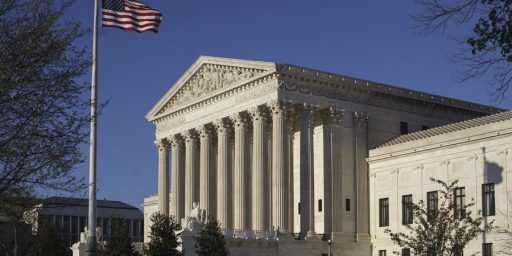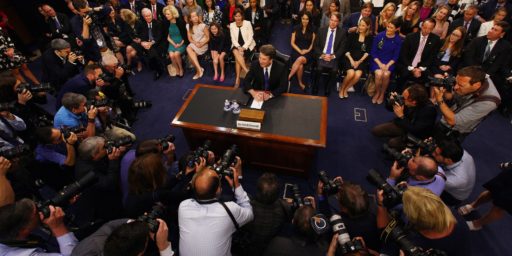SOUTHERN STRATEGY REDUX
Brett clarifies his argument in the comments section of the previous post and as an update to the original post:
Apparently it’s not sufficiently clear that I meant “their own” party, i.e., southern democrats, who overwhelmingly opposed the civil rights bills. Sorry for the unclear possessive pronoun (but really it should be pretty clear given the context; everyone knows that there was a big split in the Democrats over segregation, and that the southern Democrats lost and then defected to the Republican party).
I apologize for unintentionally mischaracterizing his argument; I was confused because it was made the context of Steven’s post. The crux of Brett’s argument, then, is the end of his post:
Southern Democrats didn’t just suddenly forgive Republicans for reconstruction and realize that there was an ideological kinship there, any more than northern black voters suddenly forgave Democrats for being the heirrs of Stephen Douglas and the confederacy. Both parties changed their tunes and reshuffled their constituencies. You may not like the tune that Republicans were singing in the 1970s — the whole affair with Trent Lott indicated not that Democrats are unfair, but that Republicans know that they have an exposed flank here — but you can’t just wish it away. And Democrats sure as heck shouldn’t let you!
This is a more persuasive argument, although one I still have some problems with.
I’m less sure of the history of this than of the civil rights bills, but my recollection is that blacks starting moving towards the Democrats during the New Deal, rather than the 1960s. Obviously, though, since they were precluded from voting in much of the country, that was not a huge factor.
Second, while I agree that the 1968 campaign of Richard Nixon marked a turning point in terms of southerners voting Republican for president, it really wasn’t until Ronald Reagan’s run in 1980 that a real realignment, that started affecting state level offices and legislative races, began.
My familiarity with the Goldwater campaign is limited, since it was such a landslide for Johnson and because I view it in the context of the later part of Goldwater’s career, as a rather ornery libertarian, and in view of his book Conscience of a Conservative. I never perceived his 1964 campaign as particularly racist and, certainly it was incredibly unsuccessful.
While it’s clear in hindsight that, at least by current standards, Nixon was a personal racist (a complicated issue, since he simultaneously used vile racial and anti-Semitic epithets yet was very close to Henry Kissinger), it’s much less clear that he ran a racist campaign or a racist administration. Indeed, most “movement” conservatives don’t think much of Nixon because they perceive him as too statist and a supporter of affirmative action and other social programs. Not to mention that George Wallace–a Democrat running as an “independent”–was the obvious choice for the racist vote in 1968 and he indeed got won 46 electoral votes in that race.
Further, while I agree that the parties changed positions to some extent during this period, race was hardly the only issue. By the early 1970s, Vietnam, Communism, school prayer, abortion, and crime were all huge issues that tended to redound to the benefit of the GOP. Unpopular decisions by the federal courts (a whole host of cases on prayer and religious expression, Roe v. Wade, Miranda, the general belief that criminals were being “let out on technicalities,” etc.) and the perception that Democrats were soft on crime, soft on Communism, and anti-military all worked in favor of the Republicans at the presidential level. Indeed, until the end of the Cold War, the GOP won every presidential contest save 1976, which they lost only by the narrowest of margins despite the Watergate scandal, Ford’s pardoning of Nixon, Ford’s dullness, and the fact that Carter was much more appealing to Southern Evangelicals.
That said, I have no doubt that the Republicans benefitted greatly by the “racist vote” in those elections and, presumably, today. In a two-party system, people have to align with one or the other to get their preferences enacted. Neither party is exactly hospitable to extremist positions of any kind. Still, by and large, Republicans are more opposed to affirmative action, welfare, and immigration than are Democrats. They’re also more likely to be “law and order” candidates. While those positions stem from honorable differences on the nature and role of government, they are more likely to be favored by racists than are the policies of the Democrats. I don’t view that as an indictment any more than I do the fact that Communists, drug pushers, and other less than savory groups are more likely to vote Democrat.
I would contend that the Republicans, on the main, are much more in line with the views of Abraham Lincoln–and indeed John Kennedy or Martin Luther King, Jr.– than are the Democrats. Republicans favor a color-blind society; Democrats want to label, categorize, and distribute by race. Support for affirmative action is much more racist than opposition to it.





As far as I can tell, MLK jr was a supporter of affirmative action programs – although of course the label “affirmative action” didn’t exist while he lived. Nonetheless, he proposed programs that would nowadays be called AA – and very strong forms of AA, in fact.
He also favored AA to help poor folks, as well as AA to help people of color; but that’s not unlike many of today’s democrats, either.
Finally, MLK was a strong critic of capitalism, and favored programs to redistribute wealth. Neither the dems or the republicans are in line with MLK’s thinking, but the dems are certainly closer.
And of course, I disagree with you that “support for aa is much more racist than opposition to it,” but that’s probably another whole discussion.
That’ll teach me to heed my own advice about pronoun antecedents. . .and to attempt to write clearer. Sorry, Jim.
We differ on AA; my position is closer to Ampersand’s. Whatever else you can say about the “colorblind constitution,” it’s pretty hard to justify that interpretation of 14th A using typical “original intent” approaches. Exaggerating slightly, perhaps, there was no colorblind constitution until affirmative action opponents found one, with vigor, in the 1980s.